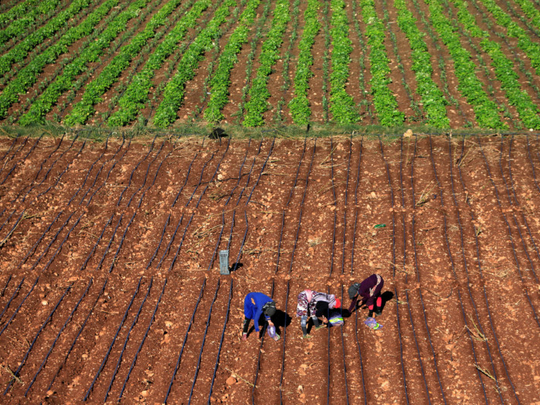
Beirut: A significant apple producer, Lebanon recorded sharp drops in apple exports in 2016, as farmers suffered from calamitous political decisions that closed various markets that, in turn, led to sharp drops in prices.
Apple farmers held dozens of protests and blocked roads across Lebanon to urge government action, asking authorities to compensate them, though this was not unlikely to occur. Small producers already sold most of the 155,000 tonnes of apples produced during this season at the very low price of LL250 (60 fils) per kilogram for storage and refrigeration. Worse, some of the leading merchants who purchased the locally produced apples felt no compunction to import apples from Turkey, to further deflate prices.
This was an unsettling situation that was directly linked to poor political decisions at the expense of hard-working peasants. For beyond meeting local market needs, Lebanese agriculture production shifted towards lucrative exports, which flourished between 2007 and 2014. In fact, exports of potatoes, citrus, apples, bananas, onions, lettuce, grapes, and apricots, in particular, recorded net increases averaging 4 per cent each year, passing from 504,000 tonnes in 2011 to 526,000 tonnes in 2014. Moreover, and despite higher production costs, Lebanese farmers survived, though import restrictions from Gulf Cooperation Council states closed various trade routes. Traditional markets like Saudi Arabia, Kuwait and the UAE were no longer willing to conduct business with Lebanon on account of Hezbollah insults hurled at regular intervals.
On Tuesday, Agriculture Minister Akram Chehayeb revealed that Prime Minister Tammam Salam reached an agreement with Egyptian President Abdul Fattah Al Sissi during a meeting held on the sidelines of the United Nations General Assembly in New York, to increase Egyptian imports of Lebanese apples. As Cairo imports up to 38,000 tonnes of Lebanese apples a year, and has been doing so since 2008, this new deal will see the figure reach 50,000 tonnes, or a third of all local production. Chehayeb announced that Lebanon would cover transporting costs while Egypt will be responsible for refrigeration.
While politicians sought a way out of the economic crisis, farmers who depended on this apple season for their livelihoods have already lost out because the deal was late in coming since small- and medium-sized producers sold their produce at very low prices. According to Antoine Howayek, head of the Lebanese Farmers’ Association, “Farmers would have sold their produce at LL600 per kilogram to Egypt instead of LL250,” adding, “those who will really benefit from this move, if approved, are big farmers and merchants.”
Chehayeb further revealed that agreements to export Lebanese apples to Jordan and Russia were under negotiation, with the former ready to accept fresh batches on October 18 instead of the end of the month, and Moscow considering a reduction of import taxes from $250 to $66 per tonne on Lebanese apples.
Why senior government officials waited until this late in the season to work on various remedial measures was a mystery. Earlier actions would have presumably benefitted farmers far more, though it was critical to note that the Minister of Agriculture was entrusted with resolving the pending garbage crisis that preoccupied and entertained many for months on end.
Frustrated by Lebanon’s recurring apple crises, farmers vented their anger on television news programmes, and promised to replace fruit trees with cannabis (hashish). Although authorities regularly claim to have eradicated the drug production, the fact remains that is big business in Lebanon as politicians duly protect the existing cartel. Few should thus be surprised if hungry apple farmers switch to the lucrative and easy-to-grow crop.












